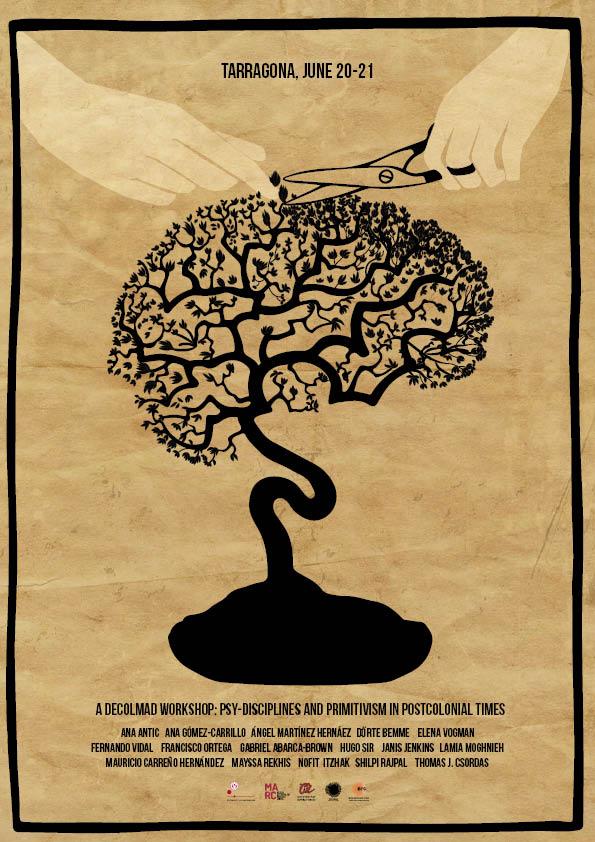DECOLMAD Workshop: Psy-disciplines and Primitivism in Postcolonial Times
This workshop will bring together scholars and researchers to discuss the intersections between psychiatry and primitivism from a historical and anthropological perspective.
 The primitive has been a controversial figure in the history of psychiatry, anthropology, and philosophy, especially since the mid-20th century. In the nineteenth and early twentieth centuries, in a European colonial context, psychiatry, neurology, and anthropology provided “scientific” frameworks such as eugenics and hygienism for the understanding of “cultural” and “racial” differences between Western and “primitive” societies. Various historians, anthropologists, and psychiatrists have described how those frameworks represented “primitives” as racially inferior, sexually impulsive, and mentally disorganized. Since the aftermath of WWII and during decolonization, psychiatrists and anthropologists have tried to leave behind these conceptualizations and languages. They have attempted to set a more horizontal communication with non-Western peoples. These new political and ethical commitments to a “common humanity” have led researchers to seek universal psychological traits and psychopathological mechanisms across different societies, redefining the relationships between culture, race, and the mind and shaping the notion of “global psyche.”
The primitive has been a controversial figure in the history of psychiatry, anthropology, and philosophy, especially since the mid-20th century. In the nineteenth and early twentieth centuries, in a European colonial context, psychiatry, neurology, and anthropology provided “scientific” frameworks such as eugenics and hygienism for the understanding of “cultural” and “racial” differences between Western and “primitive” societies. Various historians, anthropologists, and psychiatrists have described how those frameworks represented “primitives” as racially inferior, sexually impulsive, and mentally disorganized. Since the aftermath of WWII and during decolonization, psychiatrists and anthropologists have tried to leave behind these conceptualizations and languages. They have attempted to set a more horizontal communication with non-Western peoples. These new political and ethical commitments to a “common humanity” have led researchers to seek universal psychological traits and psychopathological mechanisms across different societies, redefining the relationships between culture, race, and the mind and shaping the notion of “global psyche.”
However, historians, social scientists, and psychiatrists have provided invaluable critical insights into the enduring impact of colonial tropes and concepts on contemporary psy-disciplines and the reproduction of primitivist representations. For instance, they have criticized the Eurocentric nature of psychiatry, the essentialization of culture as a fixed and homogeneous entity, the use of dichotomous categories like “traditional” and “modern,” “developing” and “developed,” the idealization and romanticization of community-based care in developing countries, and the reproduction of hierarchical frameworks in “languages of emotions” (e.g., expression of emotions versus somatization). In sum, they have highlighted how psy-disciplines have reproduced two opposing perspectives of primitivism. On the one hand, a “barbaric” perspective that equates primitive societies with degeneration, disruption, and pathogenesis and, on the other hand, an “arcadian” one through which primitive individuals and communities become pristine, harmonious, and therapeutic.
This workshop will also focus on historical debates about how psy-disciplines and primitivist representations of otherness have interacted with political ideologies and nation-state projects in different contexts. Specifically, scholars and researchers will examine how global historical processes, geopolitical influences, international scientific exchanges, political ideologies, ideals, moral frameworks, and local health traditions intertwine with research and intervention programs in post-colonial times. For instance, Jean-Michel Bégué has described how Antoine Porot and Jean Sutter proposed the concept of the “primitivism of the native Algerian” in 1939, trying to describe the “primitive part of Algeria,” which was in the middle between “the primitive and the developed Westerner.” Similarly, Ana Antic has described how the focus on the “primitive patient” defined Yugoslav psychiatry and its domestic and transnational engagements with modernity after WWII.
Furthermore, in this workshop, researchers will discuss how the contemporary entanglements between evolutionary psychiatry and genomics developments have re-redefined our understanding of the human mind and mental disorders by situating their etiological scale at the genome/ancestry level. These entanglements have impacted at individual and community levels, reshaping perceptions of self, mental disorders, and deviancy, and have provided new languages and frameworks for political identities and biosociality. Despite promoting a new universality based on our shared origins, evolutionary psy-disciplines have reproduced a colonial epistemic domain reorganizing racial order in the so-called post-racial era. For example, some studies have associated specific genotypes with gang membership and weapon use, and other studies claim that children of absent fathers engage in sexual activity -and impulsivity and substance abuse, among others- at an earlier age due to genetic traits inherited from their parents rather than as the influence of environmental aspects.
Based on these historical and anthropological discussions, this workshop will seek to address the following questions:
- How have psy-interventions and global mental health reproduced colonial legacies and enacted primitivist representations of otherness in different contexts?
- How has psy-research reproduced colonial legacies and enacted primitivist representations of otherness in post-colonial times?
- How have the entanglements between psy-disciplines and genomics re-defined our understanding of the human mind and mental disorders and impacted at individual and community levels?
- How have psychiatry and primitivist representations interacted with ideologies and nation-state projects in (post)colonial times in different contexts?
Participants
- Ana Antic – University of Copenhagen
- Ana Gómez-Carrillo – McGill University
- Ángel Martínez-Hernáez – ICREA / Universitat Rovira i Virgili
- Dörte Bemme – King's College London
- Elena Vogman – Bauhaus-Universität Weimar
- Fernando Vidal – ICREA / Universitat Rovira i Virgili
- Francisco Ortega – ICREA / Universitat Rovira i Virgili
- Gabriel Abarca-Brown – University of Copenhagen
- Hugo Sir – Concordia University
- Janis Jenkins – University of California, San Diego
- Lamia Moghnieh – University of Copenhagen
- Mauricio Carreño Hernández – Universitat Rovira i Virgili
- Mayssa Rekhis – Gothenburg University
- Nofit Itzhak – Universitat Rovira i Virgili
- Shilpi Rajpal – University of Copenhagen
- Thomas J. Csordas – University of California, San Diego
